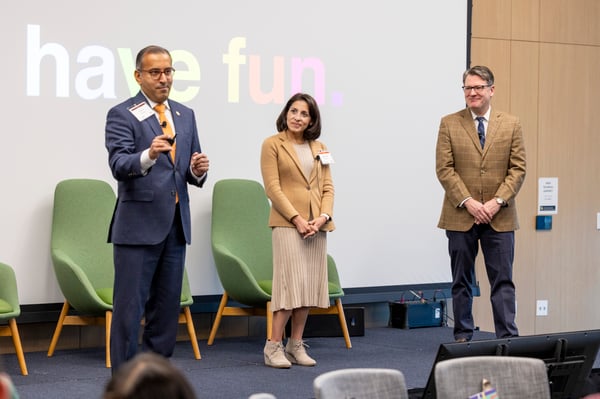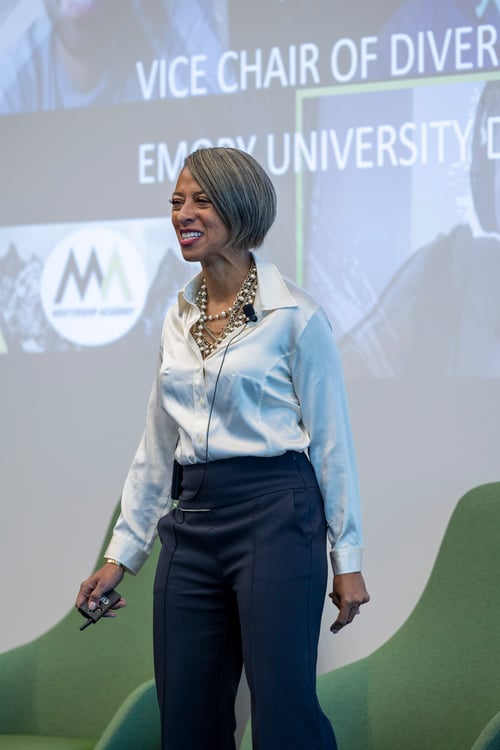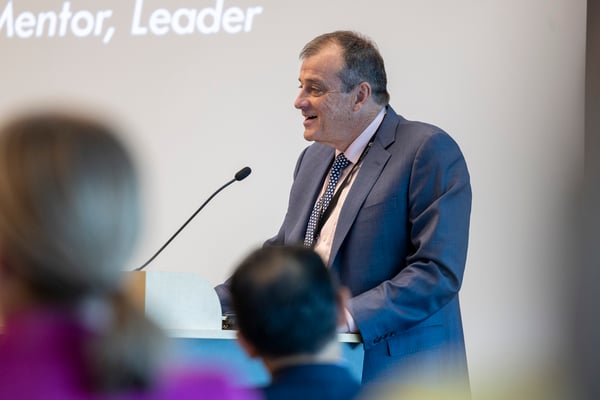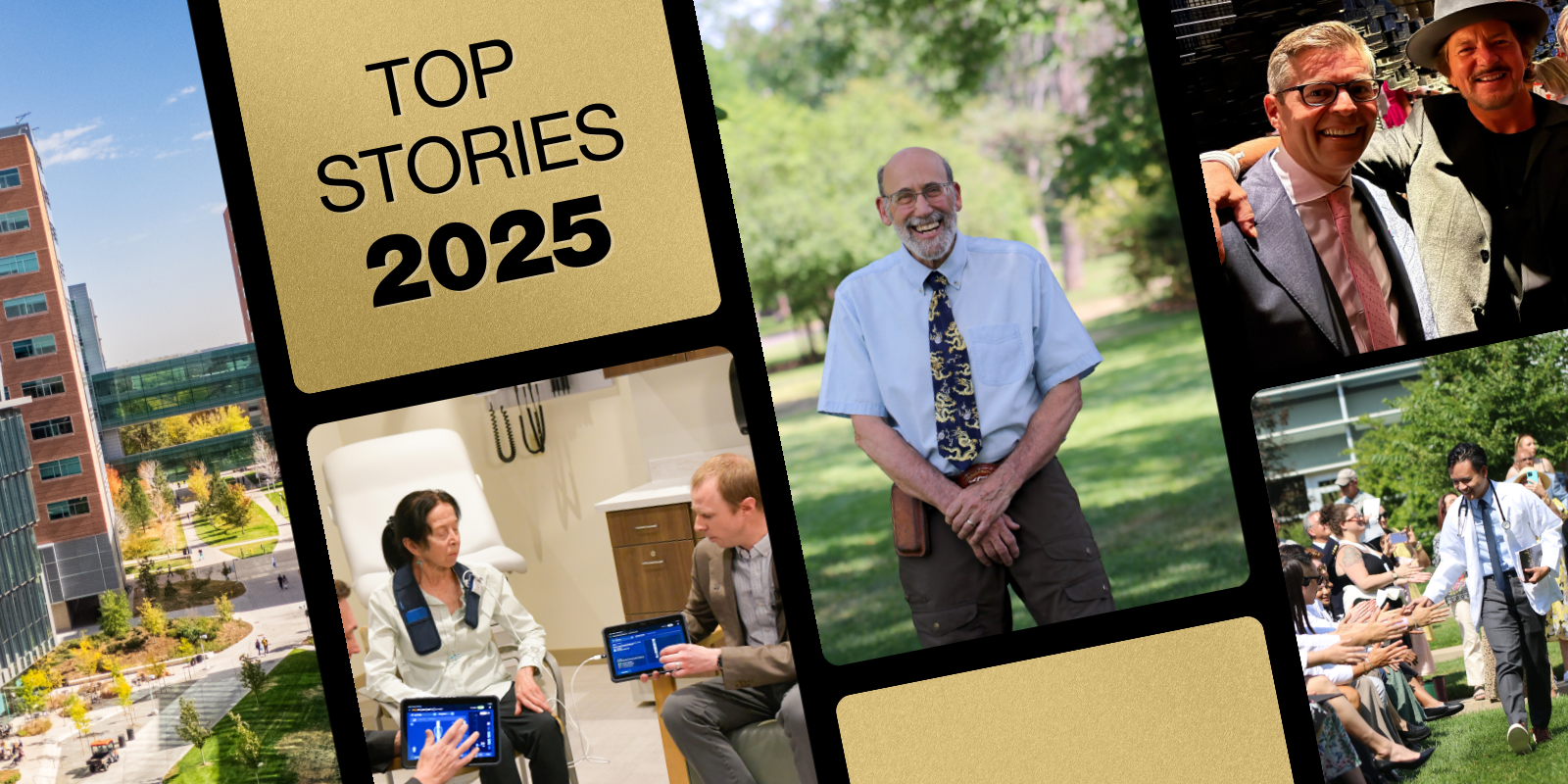More than 240 people representing 20 institutions nationwide joined together last week on the University of Colorado Anschutz Medical Campus to address the value of mentorship and career guidance for health care professionals.
The daylong Mentorship Academy, with the theme of “Climbing the Mentorship Mountain,” was co-hosted by the CU Department of Medicine and the University of Michigan Department of Surgery.
Attendees received hard-won insights from health care leaders on how to become a better mentor and more effective mentee.
→ Mentorship is a Mission: New CU Department of Medicine Programs Aim to Launch and Boost Careers
Anyone can mentor
CU Department of Medicine chair Vineet Chopra, MD, MBBS, MSc, co-organized the event along with U-M colleagues. Chopra is co-author of a 2019 how-to book, "The Mentoring Guide."
"When I first began on my academic journey, I thought mentorship was magical – a trait that lived in only a select few," Chopra said in a note to conference participants. "Over time, I have learned that these are skills that can be taught, practiced and mastered by anyone."
During one of his presentations, Chopra also spoke of the "dark side" of mentoring, telling a series of true stories, one about a mentor taking credit for a mentee's idea, and another about a mentee being strong-armed to work on a mentor's projects ahead of their own. He called such misdeeds "mentoring malpractice."

Vineet Chopra, chair of the University of Colorado Department of Medicine, speaks at the opening of Mentorship Academy 2023, on Oct. 27, 2023, at the Anschutz Health Sciences Building. He is joined by Michelle Moniz, director of The Obstetrics Initiative at the University of Michigan, and Justin Dimick, chair of the U-M Department of Surgery. Photo courtesy of CU Productions.
"Mentees will suffer disproportionately when their relationship (with a mentor) goes wrong," Chopra said, "so mentees have to be cognizant of these behaviors that threaten their own success."
Chopra plans to continue to share these insights beyond the academy, along with other skills he has learned on his own mentorship journey.
Lifting as we climb
This was the first time the annual mentorship workshop was held in Colorado. An initial academy took place at U-M in 2019, followed by a virtual meeting during the height of COVID. The series resumed as an in-person gathering last year in Ann Arbor with the CU Department of Medicine as a co-host.
The academy is designed to recognize the fact that "everyone in this room at certain times is both a mentor and a mentee," said Justin Dimick, MD, MPH, chair of the U-M Department of Surgery.
In a heartfelt keynote address with the theme of "Lifting As We Climb," Kimberly Manning, MD, FACP, FAAP, vice chair at the Emory University Department of Medicine, talked of meeting a cheerful young man working at a busy COVID vaccination and testing site in an Atlanta parking lot while she and her children were waiting in a long line of cars filled with impatient, exasperated people.

Kimberly Manning, vice chair of the Emory University Department of Medicine, delivers the keynote address at Mentorship Academy 2023, Oct. 27, 2023, at the Anschutz Health Sciences Building. Photo courtesy of CU Productions.
Impressed by the young man's positive attitude, and sensing he was uncertain about his future, Manning gave him her contact information, and later held one of many Zoom meetings with him. Flash forward: With Manning's encouragement, and edits to his application letter, the young man – the first in his family to graduate from college – was accepted at two medical schools.
"This (mentorship) work is hard and exhausting," she said. "But knowing something like this – knowing that someone I decided to give my phone number to in a parking lot is in medical school – that is the thing that will keep you going on the most tired days."
Choose carefully and it takes a team
Among other speakers at the conference was Sanjay Saint, MD, MPH, MACP, a U-M professor of internal medicine and chief of medicine at the VA Ann Arbor Healthcare System, and also a mentor to Chopra. Saint emphasized choosing mentors carefully, being sure it's a person you can trust.
"It's too bad we don't have a Yelp for mentors," said Saint, co-author with Chopra of "The Mentoring Guide" and several other books. He also advised being a good mentee by writing a specific agenda for meetings, being focused and respecting a mentor’s time.
Christine Jones, MD, MSc, associate professor of hospital medicine and associate vice chair for mentorship of the CU Department of Medicine, spoke of "mentee missteps," often caused by a lack of self-confidence, an aversion to potential conflict with a mentor, and the power dynamic between a mentor and a mentee.
"I remember, as a fellow who did not have a job offer, sitting across from my mentor who was also the person who was going to make the decision about whether they wanted to bring me on faculty,” she said. “It felt like everything I was saying was fraught. I didn't want to blow it." Both parties in a mentorship must be sensitive to such imbalances, she said.
Sunita Sharma, MD, PPH, associate professor and vice chair for faculty development and mentorship at the CU Department of Medicine, was one of several speakers to address "imposter syndrome" – feelings of self-doubt about intellect and accomplishment even among high-achieving professionals – and acknowledged her own experiences with the phenomenon.
"I recognize with these feelings that I'm not alone," she said. In a show of hands, most people in the audience indicated they had experienced imposter syndrome. She said mentors and mentees can cope with self-doubts by sharing those feelings, accepting that they occur, celebrating successes, and affirming "the hard work that got them there."
Several speakers said that mentees need more than one mentor at different levels and for different purposes. Said Chopra: “The one thing you need to learn today is that you can't have a single mentor. You need a team.”
Dean’s reflections
Late in the day's program, John J. Reilly, Jr., MD, who recently announced plans to retire after 8-1/2 years as dean of the CU School of Medicine, spoke from the heart about his own journey through professional life. Despite his long and distinguished career, imposter syndrome "doesn't go away," Reilly said.
He also talked about his daughter facing a health crisis during pregnancy while he was interviewing for the CU dean's position. "So I was really concerned," he said, "and at the same time, looking at this job, I wasn't really confident that I'm going to be successful in this job if I take it."

John J. Reilly, Jr., dean of the CU School of Medicine, speaks at Mentorship Academy 2023, Oct. 27, 2023, at the Anschutz Health Sciences Building. Photo courtesy of CU Productions.
But what he took from his daughter's crisis, which ended happily, led him to decide that "doing this job is nothing compared to doing something like that." He said he came away determined that he would "control what you can control, put one foot in front of the other, and know what the overarching goal is."
As for the state of mentorship, Reilly recalled that when he graduated from medical school 42 years ago, his mentorship consisted of informal lunches. "So what used to be informal networks has changed because the pace of our lives has changed."
He named several important mentors across his career, including CU Anschutz Chancellor Don Elliman, who helped him with career planning and increasing professional satisfaction. "But some of those perspectives come from people who are not in your profession. Be open to that, among your patients, family, friends."
Next year, the academy will move to Michigan before returning to Colorado in 2025.



